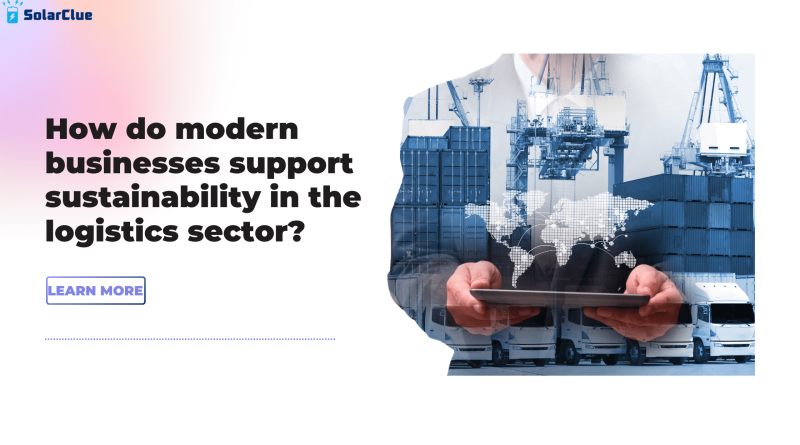Supporting Sustainability in Logistics: Modern Business Trends
In recent years, sustainability has emerged as a critical concern for businesses across various sectors, including logistics. The logistics sector, in particular, has a significant impact on the environment due to its reliance on transportation, warehousing, and packaging. However, modern businesses have recognized the importance of sustainable practices and are taking steps to minimize their environmental footprint. This blog explores how modern businesses support sustainability in the logistics sector by implementing innovative strategies and adopting eco-friendly technologies.
Sustainable Transportation
One of the key areas where modern businesses support sustainability in the logistics sector is through sustainable transportation practices. Traditional transportation methods heavily rely on fossil fuel-powered vehicles, contributing to carbon emissions and pollution. However, businesses are now turning to greener alternatives such as electric vehicles (EVs) and hybrid vehicles.
The adoption of EVs and hybrid vehicles is a step towards reducing the carbon footprint of logistics operations. These vehicles produce lower emissions, thereby improving air quality and reducing pollution. Many businesses are also exploring the use of alternative fuels, such as biofuels and hydrogen, which have even lower emissions.
In addition to using sustainable vehicles, businesses are also implementing efficient route planning practices. By optimizing routes and consolidating shipments, companies can minimize fuel consumption, reduce road congestion, and lower their overall carbon emissions. Advanced technology and data analytics are enabling businesses to make informed decisions regarding route optimization, resulting in significant sustainability benefits.
Green Warehousing
Modern businesses are also focusing on implementing sustainable practices in warehousing operations. Traditional warehouses are known for their energy-intensive operations, resulting in substantial carbon emissions. However, businesses are now embracing green warehousing practices to reduce their environmental impact.
One aspect of green warehousing is energy-efficient lighting systems. By replacing traditional lighting fixtures with LED lights, businesses can significantly reduce energy consumption. LED lights consume less energy, have a longer lifespan, and generate less heat, making them a more sustainable choice.
Additionally, businesses are investing in energy management systems to optimize energy usage in warehouses. These systems monitor energy consumption, identify energy-saving opportunities, and assist in automating processes to minimise wastage. By implementing such systems, businesses can reduce their reliance on non-renewable energy sources, leading to a more sustainable warehouse operation.
Sustainable Packaging
Packaging is another area where modern businesses are supporting sustainability in the logistics sector. Conventional packaging materials, such as plastic and Styrofoam, contribute to pollution and waste. However, businesses are now actively seeking alternative packaging solutions that are eco-friendly and recyclable.
One popular sustainable packaging option is the use of biodegradable materials. Biodegradable packaging materials break down naturally in the environment, reducing the amount of waste generated. Companies are also exploring innovative packaging designs, such as using recycled materials and reducing the amount of packaging used to minimize their environmental impact.
Furthermore, some businesses are adopting reusable packaging solutions to reduce waste. This includes using returnable packaging containers that can be sent back to the supplier for reuse. By embracing reusable packaging, companies can significantly decrease the amount of packaging waste produced, thus supporting sustainability in the logistics sector.
Collaborative Partnerships
Modern businesses are recognizing the importance of collaborative partnerships to drive sustainability in the logistics sector. By forming alliances with suppliers, customers, and industry stakeholders, companies can create a collective effort towards sustainable practices.
One example of collaborative partnerships is establishing green supply chains. Businesses are encouraging their suppliers to adhere to sustainable practices, such as reducing emissions, minimizing waste, and sourcing materials ethically. This collaboration ensures that sustainability principles are upheld throughout the supply chain, leading to a more sustainable logistics sector as a whole.
Additionally, businesses are collaborating with their customers to promote sustainable purchasing behaviors. By educating consumers about the environmental impact of their choices and offering sustainable alternatives, companies can encourage responsible consumption. This collaborative approach not only supports sustainability in the logistics sector but also contributes to broader environmental goals.
Conclusion
Embark on a journey towards sustainable logistics with SolarClue®—your dedicated guide for modern business trends. Understand the cost-effective benefits and environmental impact of transitioning to eco-friendly logistics practices. Assess factors influencing sustainability, optimize your logistics setup with expert assistance, and implement green technologies for a customized approach. SolarClue® helps navigate financing options, subsidies, and incentives, ensuring affordability for sustainable logistics. Obtain permits smoothly, learn maintenance insights, and stay informed about local market trends for maximizing returns. Join our community, share experiences, and transition to cleaner, sustainable logistics with SolarClue®. Start your eco-friendly logistics journey today!
Frequently Asked Questions
SolarClue® helps companies understand the cost-effective benefits and environmental impact of adopting eco-friendly logistics practices, emphasizing reduced carbon footprint, cost savings, and long-term sustainability.
SolarClue® assists companies by explaining factors contributing to sustainable logistics, helping them assess and optimize these factors for efficient and eco-friendly practices.
SolarClue® guides companies in implementing green technologies and renewable energy solutions, providing a customized approach that fits their budget and promotes sustainable business practices.
SolarClue® provides resources to help companies explore financing options, subsidies, and incentives for sustainable logistics, making their investment in eco-friendly practices more affordable and financially viable.
SolarClue® offers insights into maintenance requirements for green technologies in logistics, educating companies on caring for their setups for long-term efficiency and affordability.
SolarClue® supports companies by providing information on the regulatory landscape, assisting in obtaining necessary permits for sustainable logistics practices, ensuring compliance with local guidelines, and facilitating a smooth process.
SolarClue® provides information on potential cost savings and ROI, assisting companies with calculations and strategies to maximize the benefits of investing in sustainable logistics.
SolarClue® fosters a community where companies share experiences with sustainable logistics, creating a supportive space for learning, troubleshooting, and advice to enhance the overall transition to cleaner and more efficient logistics.
SolarClue® provides additional tips and best practices to companies, ensuring they make well-informed decisions and optimize their sustainable logistics investments for maximum affordability, efficiency, and environmental impact.
SolarClue® stays updated on the latest trends and technological advancements in sustainable logistics, providing companies with cutting-edge information to make informed decisions about their eco-friendly logistics investments.




